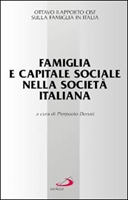EIGHT REPORT
Family and Social Capital, 2003
 Contemporary societies are rediscovering the value of “social capital”, intended as a patrimony and as a cultural resource which sustains relations based on trust, cooperation, and reciprocity between persons. Even if the concept of social capital is still in a phase of definition, it haunts at something essential to avoid the dehumanisation of social life. What only a few have high-lightened is the fact that in the national and international debate there exists a deep ambivalence towards the family, which seldom and arduously appears as a subject capable of generating social capital.
Contemporary societies are rediscovering the value of “social capital”, intended as a patrimony and as a cultural resource which sustains relations based on trust, cooperation, and reciprocity between persons. Even if the concept of social capital is still in a phase of definition, it haunts at something essential to avoid the dehumanisation of social life. What only a few have high-lightened is the fact that in the national and international debate there exists a deep ambivalence towards the family, which seldom and arduously appears as a subject capable of generating social capital.
The family is seen with many reserves and suspects as a resource of trust based relations.
The contributions start from a distinction, between primary social capital formed by the family and secondary social capital formed by associative networks and relations in the civic sphere. The distinction is theoretically and empirically widely argued.
Various dimensions are explored, demonstrating that the family social capital results to be crucial and unavoidable for the well being of persons and the community. The Report presents the first original empirical survey, representative of Italian population, on “ family and social capital”.
It is observed that the families which are less fragmented and more supportive are an effective social capital for society, while the other family forms do not contribute to the creation of social capital, but tend to consume it.
Taken in consideration that the development of society stands on social capital, and that the civil and democratic quality of social life wastes away with the declining of social capital, it becomes crucial to understand why and how the Italian family is essential for the regeneration of the social fabric and how the family can be supported and promoted in that direction.
Do we still need the family to produce social capital?
Pierpaolo Donati
The family as primary social capital
Pierpaolo Donati
Familiar social capital and sociality: a survey of the Italian population
Riccardo Prandini
How and when families generate pro-social behaviour in children?
Eugenia Scabini, Elena Marta
Family, school and social capital
Luisa Ribolzi
How and when the family “associationism” generates social capital?
Experiences of subsidarity in social policies in Lombardy
Giovanna Rossi
Family and social capital in health
Carla Collicelli
The role of the family in generating social capital: an approach of political economics
Simona Berretta, Luigi Curini
Religion, family and social capital
Pierangelo Squeri
For a non capitalistic interpretation of the family as social capital
Pierpaolo Donati